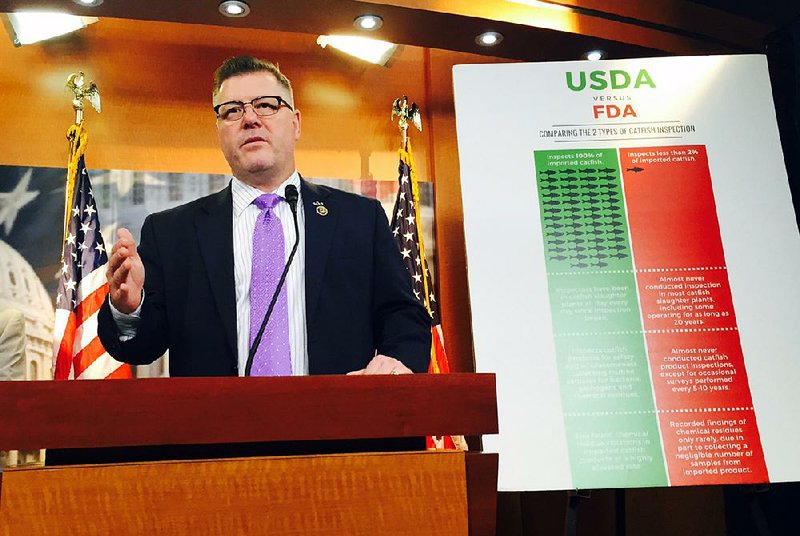WASHINGTON -- U.S. Rep. Rick Crawford, R-Ark., and lawmakers from other catfish-farming states said they will fight to protect a new catfish inspection system that critics say is wasteful and unnecessary.
At a Capitol Hill news conference Wednesday, Crawford and a half-dozen other Southern congressmen called on their colleagues to let U.S. Department of Agriculture inspections continue, arguing they protect public health and create a level playing field for the nation's catfish industry.
Crawford is circulating a letter defending the program, and roughly 50 legislators already have agreed to sign it, he said.
"This affects all of us. We're all part of the food chain, so I think we need to be diligent in making sure that all of us ... are protected," Crawford said.
Supporters say the Agriculture Department program is keeping contaminated fish off American tables. Opponents say the inspections should be done by the Food and Drug Administration, which already monitors farmed salmon, trout and tilapia as well as seafood.
The Senate voted 55-43 last month to derail the USDA program. In the House, 177 U.S. representatives have signed a letter urging their leadership to schedule a vote on the proposal -- Senate Joint Resolution 28.
Under the Congressional Review Act, regulations establishing the USDA inspection program will be blocked if a majority in both chambers oppose them.
The USDA only began inspecting catfish in April. Before then, the FDA handled the job.
The FDA inspected less than 2 percent of all imported catfish; the USDA checks 100 percent, Crawford said.
The closer scrutiny has been helpful, Crawford's letter states.
"Indeed, not more than a week after USDA began inspecting imported catfish," the agency detected and refused 2,000 containers of Vietnamese catfish with elevated levels of Malachite Green and Enrofloxacin, two dangerous banned carcinogens considered a public health risk. In addition, a recent shipment of Chinese catfish was turned away because they refused inspection," it stated. "Had the catfish inspection program not been in place, it is more than likely these shipments would have ended up in the domestic food supply."
"In two years of inspection the FDA found less [contaminants] than USDA in only two weeks," the letter states.
Arkansas had the third-largest commercial catfish crop in the nation last year, with sales of $18.5 million. Roughly 5,800 acres were devoted to catfish aquaculture, according to the USDA.
Nationwide, catfish growers collected $361 million; domestic catfish output has fallen sharply over the past decade as cheaper catfish imports have flooded the market.
U.S. Sen. John McCain, R-Ariz., is leading efforts to stop the new inspection program.
"The USDA catfish inspection office is an egregious waste of taxpayer dollars and a classic example of anti-free-market protectionism," he said after the Senate vote. "This office -- which [the Government Accountability Office] has repeatedly labeled as 'wasteful and duplicative' -- serves no other purpose than to benefit a handful of special-interest domestic catfish farmers in Southern states at American consumers' expense. It's past time we finally send this duplicative, big-government program out to sea."
The Agriculture Department already inspects the nation's beef, pork and poultry products, and Bill James, a retired USDA official, said aquaculture also should be under its purview.
"In my opinion, farm-raised animals, whether they be mammals, whether they be birds, whether they be fish, should go to USDA because USDA has more experience with that sort of thing and does a better job," said James, who now consults for the catfish industry.
Chad Causey, a spokesman for Catfish Farmers of America, said the entire industry will be harmed if tainted products are allowed to enter the food supply.
"The domestic industry is very confident and proud of the product that it produces. It's a U.S. farm-raised product. It's clean. It's safe and it's wholesome," he said.
Catfish and catfishlike imports from China and Vietnam are inferior, he said. "The growing conditions. The drugs that are used in the rearing of those fish. It is substandard, and it has dangerous consequences for American consumers."
Business on 06/23/2016

